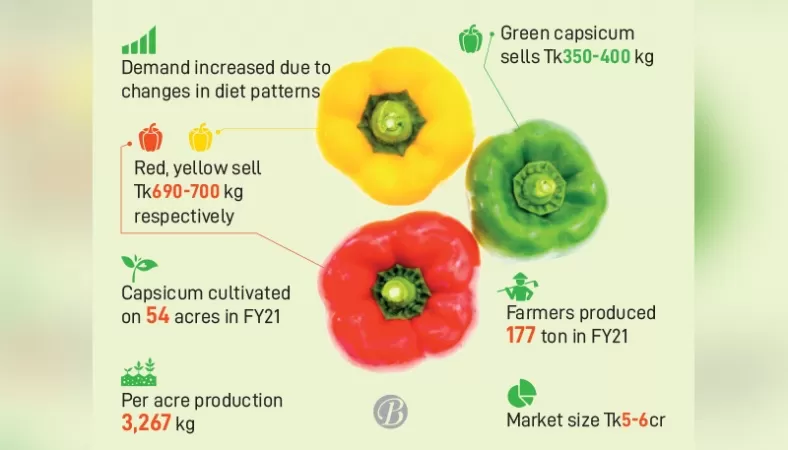
Local capsicum dominates market

Capsicum, also known as bell pepper, used to be a vegetable only bought by restaurants or well-off people even a few years ago. Exported from Thailand or Malaysia, it was only available in a handful of shops in the capital.
However, local farmers have brought about a change to the scenario. Nowadays, capsicum has earned a place among the local vegetables.
According to Bangladesh Bureau of Statistics (BBS) data, capsicum production has increased four and a half times in the last year alone.
Capsicum production in the country was just over 7 tonnes in 2017-18. In 2018-19 it slightly increased to 11 tonnes.
According to DEA data, in FY21, Bangladesh cultivated capsicum on 54 acres and produced 177 ton, which was 13.4 acres and 39 ton in FY20.
Per acre production was 3,267 kg against 2,902 in the previous year.
While there is no official data on how large the capsicum market is in the country, farmers and traders of this vegetable have the opinion that it could be around Tk 5-6 crores, which can be expanded upon.
Officials at the Directorate of Agricultural Extension (DAE) say supports from the government are missing to boost the production of this vegetable, which has great export potential.
When asked, DAE Field Service Wing Director Habibur Rahman Chowdhury said that the cultivation and marketing of capsicum are increasing due to good profit and rising demand among the people in the country.
“We have not yet taken any training or marketing assistance initiative in this regard. However, our upazila agriculture officers assist any farmer who asks for assistance in this matter,” he said.
During the peak season, green capsicum is sold at Tk 85-130 per kg by farmers, while red and yellow capsicum is sold at Tk 300-400 per kg. Green capsicum sells for Tk 150-200 per kg in the wholesale market and Tk 200-250 in retail.
On Saturday, green capsicum was sold at Tk 350-400 per kg, while red and yellow capsicums were sold at Tk 690-700 per kg in various markets and super shops of the capital.
Capsicum is cultivated in Bhola, Jashore, Chuadanga, and Pabna, as well as some areas on the outskirts of Dhaka such as Dhamrai and Gazipur. Since there is ample demand, this vegetable is cultivated year-round in greenhouses.
Farmers are showing more interest in producing capsicum mostly because of the low production cost yielding high profit, said Md Habibur Rahman, a green capsicum farmer in Dhamrai.
“Green capsicum can be farmed like common chilli, without any extra expenses. But it can be sold for a high price,” he said.
The farmer explained that last year, he cultivated green capsicum on 1.5 bigha land which yielded 7000kg capsicum. He sold it for Tk 85-120 per kg and his total income was Tk 8 lakh.
“My production cost is one-fourth of the income. This year, I am cultivating capsicum on 2.5 bigha land,” he added.
Encouraged by Habib’s initiative, many people in the upazila have taken up the cultivation of capsicum, he said.
Due to the steady supply from local growers, capsicum import has dwindled. Helal Uddin, the proprietor of Fruits Valley Agro in Chandpur and a yellow and red capsicum grower, said traders are losing interest to import capsicum due to its high import duty.
Bangladesh Fruits, Vegetables and Allied Products Exporters Association President SM Jahangir Hossain said, “Capsicum is in high demand in countries where we export vegetables.”
“However, there are two reasons why we can’t export capsicum. First, we produce less capsicum than the country’s demand, which is why producers and traders get good value from selling it locally. Second, our Capsicum export cost is very high. It may be possible to export capsicum in the future if domestic production increases and prices come down,” he said.
Editor & Publisher: S. M. Mesbah Uddin
Published by the Editor from House-45,
Road-3, Section-12, Pallabi, Mirpur
Dhaka-1216, Bangladesh
Call: +01713180024 & 0167 538 3357
News & Commercial Office :
Phone: 096 9612 7234 & 096 1175 5298
e-mail: financialpostbd@gmail.com
HAC & Marketing (Advertisement)
Call: 01616 521 297
e-mail: tdfpad@gmail.com